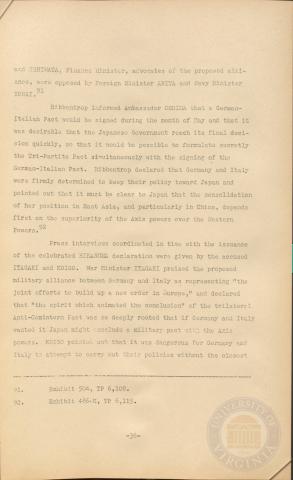
Page 36
| Parent | Japanese - German - Italian Collaboration |
|---|---|
| Date | |
| Language | English |
| Collection | Tavenner Papers & IMTFE Official Records |
| Box | Box 14 |
| Folder | Japan, Germany, Italy Collaboration and Introduction |
| Repository | University of Virginia Law Library |
and ISHIWATA, Finance Minister, advocates of the proposed alli¬ance, were opposed by Foreign Minister ARITA and Navy Minister
YONAI.91
Ribbentrop informed Ambassador OSHIMA that a German- Italian Pact would be signed during the month of May and that it was desirable that the Japanese Government reach its final deci¬sion quickly, so that it would be possible to formulate secretly the Tri-Partite Pact simultaneously with the signing of the German-Italian Pact. Ribbentrop declared that Germany and Italy were firmly determined to keep their policy toward Japan and pointed out that it must be clear to Japan that the consolidation of her position in East Asia, and particularly in China, depends
first on the superiority of the Axis powers over the Western
Powers.92
Press interviews coordinated in time with the issuance of the celebrated HIRANUMA declaration were given by the accused ITAGAKI and KOISO. War Minister ITAGAKI praised tl^e proposed military alliance betv/een Germany and Italy as representing "the joint efforts to build up a new order in Europe," and declared that "the spirit which animated the conclusion" of the trilateral Ahti-Comintern Fact was so deeply roo.ted that if Germany and Italy wanted it Japan might -conclude a military pact with the Axis powers. KOISO pointed out that it was dangerous for Germany and Italy to attempt to carry out their policies without the closest
91.Exhibit ?04, TP 6,108.
92.Exhibit 486-K, TP 6,11?.
